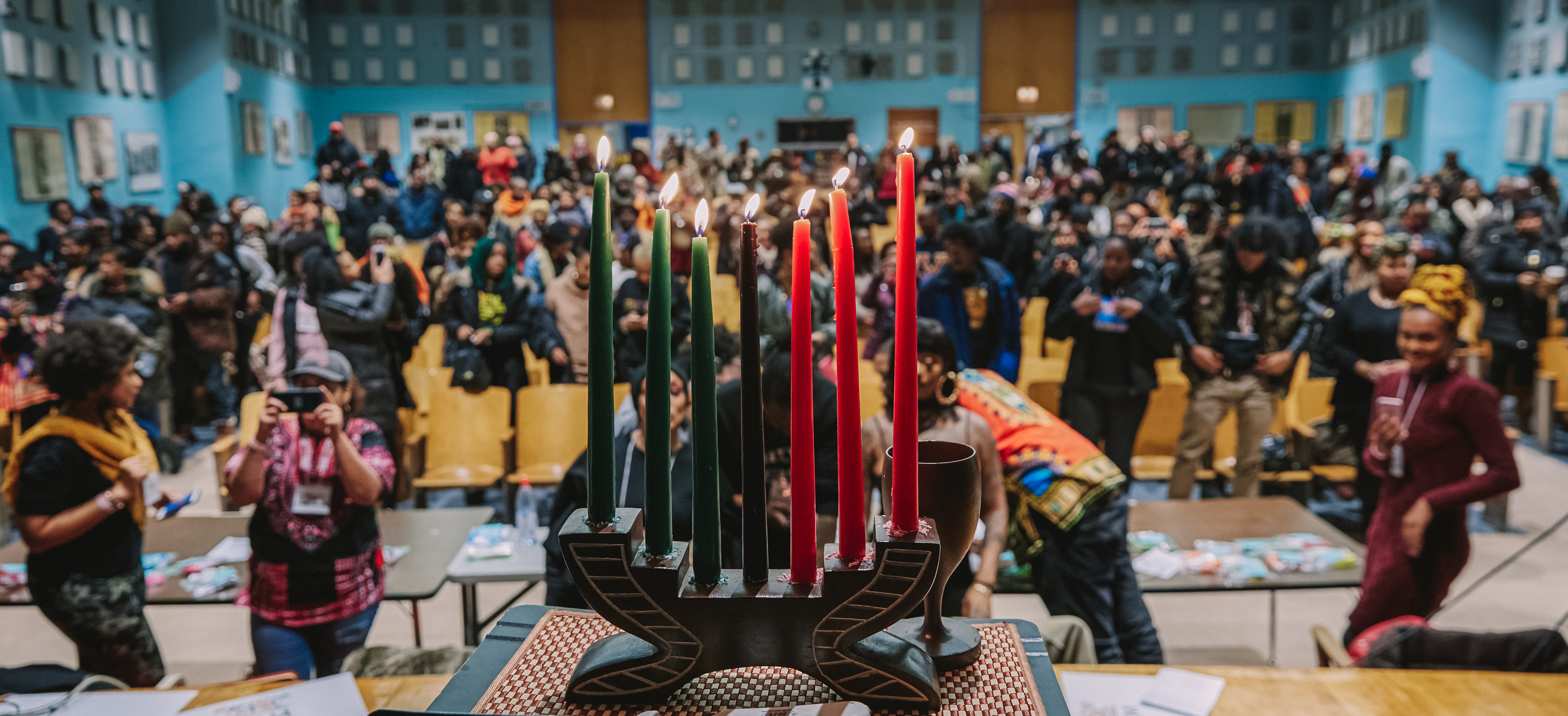
Source: Deneka Peniston / Deneka Peniston
The other day while talking with my cousin, I asked about her holiday plans and she replied with a deep sigh: “I’m still recovering from Thanksgiving, check back with me in about 3–5 business days.” As amusing as it sounds, I didn’t even have to ask. As a Black woman, I high-key peeped the situation.
The holidays are meant to be a seasonal period of freedom, relaxation and celebration. But in my years of observing the holidays, I’ve found it difficult to enjoy all the freedoms while shopping for decorations, gift-giving, preparing holiday meals, budgeting, hosting, etc.
However, what I did realize during our conversation is the waymaking, unsung holiday hero that is a Black woman— who’ve normalized the obligatory stress and anxiety that the holidays tended to bring. Those like our mothers, grandmothers, sisters, cousins and best friends, carry much and complain little to make holidays worthwhile for everyone.
Holiday expectations and responsibilities typically fall on women to fulfill. The truth is, women carry an unjust holiday burden around regularly. More importantly, for Black women, bearing financial pressures and personal demands during this season may be even more immense in our daily midst of racial disparities, disproportionate and high maternal mortality rates, and continued work pay gaps, — all the while trying to lead softer lives.
Is it possible though, that expectations and responsibilities based on the right principles can cultivate a season of self-care, clarity, and recentering, and ultimately make a difference in a Black woman’s world?
The Watts riots of 1965 were an uprising of looting and protests to end police mistreatment and discrimination in housing, employment and the education system. Six days of unrest informed change such as constitutional amendments, public awareness from civil rights leaders, and more specifically,  an African American holiday.
In 1966, professor and author, Maulana Karenga created Kwanzaa in the aftermath of the Watts uprising, with the intended goal of providing an alternative to African Americans to the existing Christmas holiday. Karenga also contended that Kwanzaa was also an opportunity for African Americans to celebrate themselves and their history, rather than simply imitating the practice of the dominant holidays.
Kwanzaa is observed from Dec. 26 through Jan. 1 and celebrates the seven principles of African Heritage centered on purpose, identity and direction. Each day of Kwanzaa is dedicated to the principles as follows:
- Umoja (Unity): To strive for and to maintain unity in the family and community.
During the holiday season, family and friends unite to celebrate and participate in traditions together such as decorating, gift-giving, baking, shopping, etc. This is the perfect opportunity to reach out to loved ones in advance, possibly via a text/email chat group where everyone can stay in touch and up to date on tasks, activities and reminders.
Speaking of tasks, a day of striving for unity could also be a good time to organize and delegate responsibilities to everyone to relieve yourself of an uneven load of demands and duties. It is important to view delegation as not simply passing on tasks, but empowering others to help contribute to holiday celebrations.
Once the work of evenly distributing responsibilities has been established, we are now free to unite and foster connection with our families and friends over a gathering of food, recipe exchanges, or a night of movies and games.
- Kujichagulia (Self-determination): To define and name ourselves, as well as to create and speak for ourselves.
Emphasizing that Kwanzaa was created with self-determination in mind, day two could potentially be the perfect opportunity to review and focus on activities that reinforce the principle of self-determination such as setting aside time to study the meaning of Kwanzaa symbols and how they illustrate our history and values.
For example, one of the main symbols of Kwanzaa is the seven candles representing the principles in three official colors: one Black candle, three red candles and three green candles. The single black candle represents the self, the three red candles represent our bloodshed history, and the three green candles represent Earth and endless possibilities for the future.
Such principles can compel us to determine our focus during this holiday season. It may include taking action over our time and finances, finally doing that one thing fear has stopped us from achieving, journaling our intentions for the season, or seeking therapeutic alternatives such as meditation or light exercises.
- Ujima (Collective work and responsibility): To build and maintain our community together and make our brothers and sisters problems our problems and solve them together.
Though Black women hold a longstanding reputation for doing the work of many, no one person is completely self-sufficient. Collective work and responsibility will require self-criticism and personal evaluation. And once we’ve had time to center our focus and well-being, day three is the perfect time to build and maintain our community by checking in with our fellow Black female tribe (mothers, grandmothers, daughters, sisters, cousins, friends, etc.) during the holiday season.
You may find that discussing collective work and responsibilities amongst each other is helpful in achieving goals without over-exerting oneself. Tasks such as holiday grocery and gift shopping may turn into activities rather than demands when accompanied by your tribe.
- Ujamaa (Cooperative economics): To build and maintain our own stores, shops, and other businesses and to profit from them together.
In the same manner that Black women shouldn’t have to endure an unequal share of demands and responsibilities, the saying goes for social wealth; — a value of resources that belongs to the masses of people who helped create it. And that would be us.
Day four can be our chance to commit to the practice of sharing social wealth and work necessary to achieve equitable affluence in our families, such as committing to holiday shopping in our own communities or shopping with our families and friends who own businesses. Financially supporting and promoting Black female-owned businesses is a great place to start. They shouldn’t be too hard to find. A waymaking Black woman can spot another.
The principle of sharing social wealth can also be influential in building our own businesses, and ultimately controlling the economics of our own community. Perhaps the best gift you can give a Black woman this season is to support her cause — irrespective of the amount contributed.
- Nia (Purpose): To make our collective vocation the building and developing of our community in order to restore our people to their traditional greatness.
While financial freedom provides the means to pay bills, food and other necessities, it’s not enough to just have money. But it can have much more meaning if used for a purpose.
A principle of restoration can encourage us to look within to set more than personal goals, but to choose goals that will benefit the well-being of ourselves and our families.
Taking action such as reviewing holiday expenses may give us direction and a new way of looking at spending our money in the future. Holiday budgets are not as fun, but they’re essential. And when you know what you can afford ahead of time, you’ll know the availability of what you can spend.
Aside from financial reasons, the purpose principle could also help us determine where our time, focus, and attention can make the most difference, meanwhile lifting the burdens of overcommitting to several tasks and demands.
- Kuumba (Creativity): To always do as much as we can, in the way we can, to leave our community more beautiful and beneficial than we inherited it.
The spirit of restoration can spring about creativity. As we strive to restore ourselves, our great works, and our families, there’s nothing like getting creative as a means of relaxing, relating and releasing (words famously said by Debbie Allen).
On day six, we can use our creative energies to participate in a dance celebration, paint, start a garden or stay inside creating that vision board we’ve been procrastinating about, create crafts and gifts with the kids, or read a new book tied to our personal goals for the future. Such principles can also compel us to not have fun but also to find new ways to do ordinary things more creatively.
Creativity has no limits. Neither should we.
- Imani (Faith): To believe with all our hearts in our people, our parents, our teachers, our leaders, and the righteousness and victory of our struggle
Black women from history to the present, face escalated racism, misogyny, and classism consistently and frequently. Such mistreatment compelled us to rely on both liberating religious values as well as heightened spiritual ones,  and for good reason.
The final principle of Kwanzaa reminds us that having faith and believing in ourselves can help us overcome challenges and succeed in the way we should go. Because of our unwavering spirit and fierce determination, the ways to cultivate faith during the holidays are boundless.
Ways such as nurturing a personal relationship between self and the Creator, practicing meditation, retaining a support circle, engaging in the exploration of nature, and committing to self-love and self-care can teach us the intrinsic benefit of leaning on varied values of faith for inner strength.
For Black women, the holiday season can often bring a number of unwelcome guests such as stress, grief, anxiety and depression. And making decisions, fulfilling tasks, and meeting demands often places women— specifically Black women—at the center of holiday expectations.
Perhaps the one thing that could help prevent such distress is for us to be more open in choosing the most realistic traditions and rituals to hold on to or strive to create new ones. The principles of Kwanzaa can potentially help us combat holiday stress, avoid overspending and prepare to plan ahead for the future.
The principles of Kwanzaa are vital, cultural fabrics of America and are worthy of seasonal freedom, relaxation and celebration.
And so are Black women.
RELATED CONTENT: Detroit Will Host The World’s Largest Kwanzaa Kinara This Year












